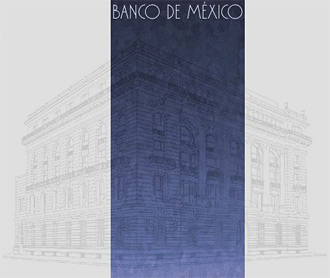 |
 |
 |
 Business News | June 2006 Business News | June 2006  
Growing Mexican Economy May Tip Elections
 Will Weissert - Associated Press Will Weissert - Associated Press


| | Economic output grew 5.5 percent in the first quarter and the economy is expected to expand by more than 4 percent this year, improving the way many Mexicans view Fox. |
Mexico's economy has taken off just before the July 2 presidential elections — news that could boost ruling party candidate Felipe Calderon as he runs neck-and-neck with leftist Andres Manuel Lopez Obrador.

Lagging economically for most of President Vicente Fox's term, Mexico is registering its highest growth rates in nearly six years. Public coffers are overflowing with oil profits, manageable inflation is keeping the peso under control, the housing market is booming and an economic recovery in the United States is helping Mexican exports.

"It's the most important factor, just like in the United States," said Cesar Castro of the Center for Economic Analysis and Projections in Mexico City. "The economy is doing well, and Calderon is capitalizing."

But Lopez Obrador is tapping into frustration with Fox's failure to raise wages, winning over voters like Rafael Jimenez, an appliance repairman in Mexico City's crime-ridden Doctores neighborhood.

"The economy doesn't look strong," said Jimenez, who makes just over $40 for a 10-hour day. Jimenez's salary is more than double Mexico's average daily wage of $18. But he still struggles.

"My family, my neighbors and I, we work harder than ever, but we don't earn more," he said.

Economic output grew 5.5 percent in the first quarter and the economy is expected to expand by more than 4 percent this year, improving the way many Mexicans view Fox. That has helped Calderon, of Fox's conservative National Action Party, who plans to continue the president's austere spending programs and free-market policies. Mexican law limits presidents to one six-year term.

On the campaign trail, Calderon, Fox's former energy secretary, trumpets the economic stability that has characterized the current administration.

The economy continues to rely on money migrants in the United States send home, which climbed to more than US$7 billion through April.

But Lopez Obrador says the fact that so many must leave the country to make a living is an embarrassment.

"I've been all over the country, and in most parts, there is no work and a lot of poverty," he said during a televised debate Tuesday night.

Public opinion polls show Calderon about even with Lopez Obrador, who resigned as mayor of Mexico City in July to run for president.

Roberto Madrazo, whose Institutional Revolutionary Party, or PRI, controlled the presidency from 1929 until losing to Fox in 2000, is in third place. Many voters are still wary of the PRI, a party that was kicked out of power mostly due to public frustration with corruption, vote-buying and economic crashes.

Working to carve out a legacy, Fox has championed himself as the housing president, touting government loans that made it easier for working-class families to buy homes and sparked a building frenzy.

It is one of the few economic bright spots for the president, who took office promising to create 1 million new jobs a year — only to have the Sept. 11 attacks trigger a slowdown in the United States that spilled over into Mexico.

Economic recovery here started in 2004, when things began to turn around in the U.S. and oil prices started climbing. Mexico is the third-largest supplier of crude oil to the United States.

However, analysts say Mexico is draining its main oil field and will have trouble maintaining its supply in the coming years, unless it allows more private investment in the state-run industry and steps up exploration. Calderon proposes allowing more private investment to fund exploration projects, while Lopez Obrador argues against that and says Mexico should build more refineries.

Castro said the number of jobs offering government insurance — a key indicator of formal employment — grew 6.1 percent in the first two weeks of May and that the trend should continue for the rest of the year.

But he added that, in the past five years, the Fox administration has only succeeded in creating 180,000 jobs annually in a country of 103 million.

"The sixth year will help a lot, but as a whole the Vicente Fox government has performed very poorly," he said. "But Mexicans, just like everybody, only remember what's happening now."

They also remember the years of economic instability under the Institutional Revolutionary Party.

Mountains of foreign debt and low cash reserves led to a peso crash when President Miguel de la Madrid succeeded Jose Lopez Portillo in 1982. De la Madrid set about paying off the debts, eventually sending inflation soaring. Prices increased faster than the currency devalued, triggering another financial meltdown in 1987.

Then 1994 saw political jitters prompt a massive flight of foreign capital as President Ernesto Zedillo replaced Carlos Salinas. The peso plummeted again.

But the economy held stable when Fox succeeded Zedillo nearly six years ago, and the succession in December won't mean economic ruin, with government reserves at an all-time high of $76 billion, Castro said.

"I don't know if this is an economic boom, but the peso isn't falling to the floor," said Ana Maria Lopez, a 30-year-old saleswoman. "That's a positive sign."

Economic analyst Rafael Camarena, of Santander Serfin Financial Group, said the peso should remain stable, despite slight devaluations against a strengthening dollar in recent weeks.

"Fundamentally, the economy is strong," Camarena said. "The election will attract a lot of attention, and it's going to be very competitive. But we believe that will only mean high voter turnout and not anything catastrophic."

On the Net: http://www.banxico.org.mx/siteBanxicoINGLES/index.html | 
 | |
 |



